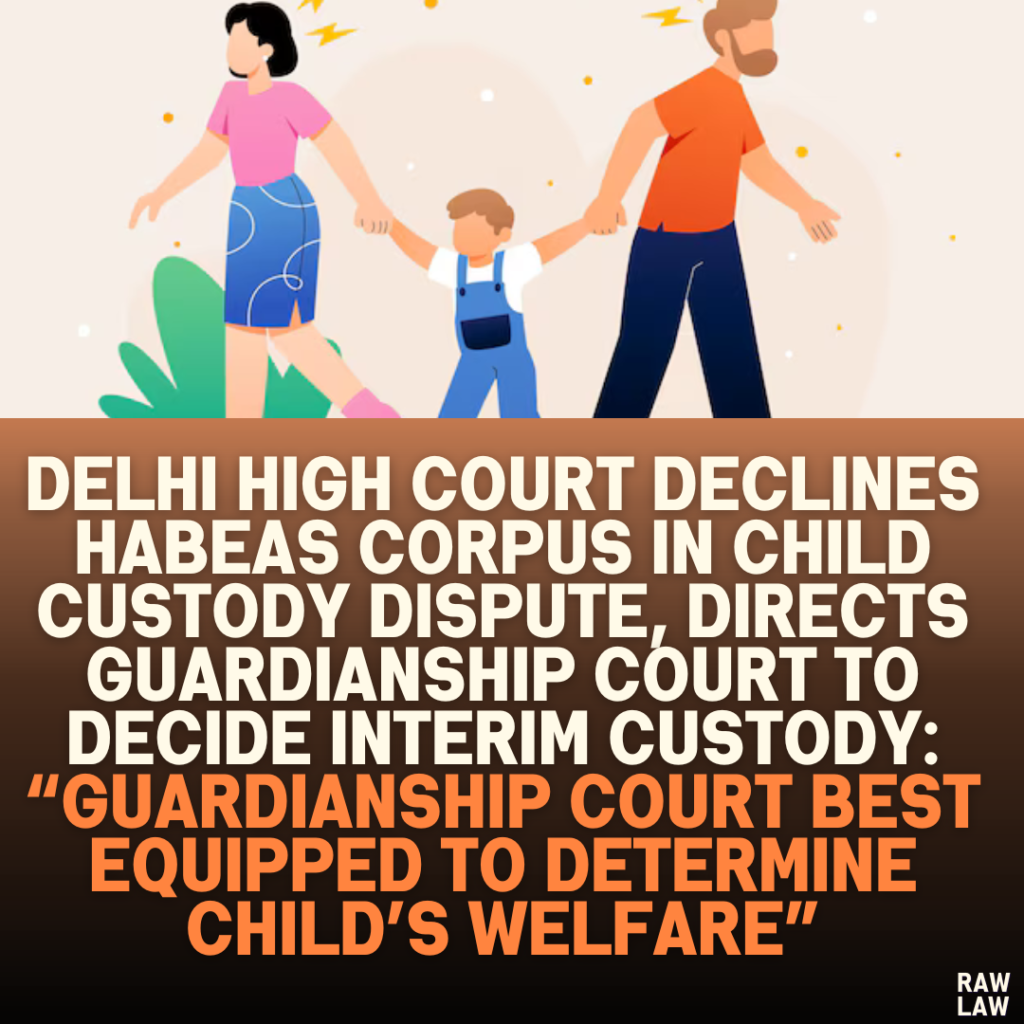Court’s Decision
The Delhi High Court dismissed the habeas corpus petition filed by the petitioner (the mother) seeking immediate custody of her minor daughter. Instead, the court directed the respondent (the father) to produce the child before the Guardianship Court, which would determine the appropriate interim arrangement. The court emphasized that the guardianship petition, already pending before the Family Court, was the correct forum to address the custody issue.
Facts
- The petitioner and the respondent were married in 2008 under the Arya Samaj traditions and later formalized their marriage under the Special Marriage Act in 2012.
- The couple has a daughter, born in 2017, who was studying at a well-known school in Delhi.
- Due to marital discord, the petitioner filed a domestic violence complaint on October 19, 2024, alleging misconduct by the respondent.
- On October 23, 2024, the respondent allegedly took the child from the matrimonial home without the petitioner’s knowledge and moved to Jharkhand, where the child was staying with her paternal grandmother.
- The petitioner claimed that the respondent had forcefully removed the child from her custody, disrupting the child’s education and routine.
Issues
- Whether a writ of habeas corpus is appropriate for resolving child custody disputes in matrimonial cases.
- Whether the respondent’s actions constituted illegal detention of the child, warranting immediate judicial intervention.
Petitioner’s Arguments
- The petitioner argued that the respondent had unlawfully taken their minor child without her consent or notice.
- She highlighted her role as the primary caregiver and emphasized that the child’s education and well-being were disrupted by the respondent’s actions.
- The petitioner sought immediate custody of the child, alleging that the respondent’s conduct was contrary to the child’s best interests.
Respondent’s Arguments
- The respondent maintained that the child was safe and well cared for by her paternal grandmother in Jharkhand.
- He argued that the child did not wish to meet her mother due to continuous interference from the petitioner’s family.
- The respondent alleged that his actions were motivated by concern for the child’s safety and well-being, not malice or illegal intent.
Analysis of the Law
- Habeas Corpus as a Remedy:
- The court observed that habeas corpus is a limited remedy designed to address illegal detention or confinement.
- In cases of child custody, particularly when there are ongoing matrimonial disputes, the guardianship court is the appropriate forum for deciding custody based on the child’s best interests.
- Guardianship Proceedings:
- The petitioner had already filed a guardianship petition under the Guardians and Wards Act, which was pending before the Family Court in Delhi.
- The court noted that the guardianship court is better equipped to evaluate evidence, hear the parties, and make decisions regarding custody and interim arrangements.
Precedent Analysis
- The court followed established precedents stating that disputes over custody should be adjudicated in guardianship proceedings rather than through extraordinary writ remedies.
- It emphasized that habeas corpus is not a substitute for legal processes specifically designed to resolve complex custody issues.
Court’s Reasoning
- The court acknowledged the petitioner’s concerns but highlighted that the Guardianship Court had already taken cognizance of the matter.
- It stated: “The guardianship court is equipped to evaluate the best interests of the child after hearing all parties and examining evidence.”
- The court reasoned that immediate intervention via habeas corpus was unnecessary since the child’s safety was not at risk and the guardianship court could address the petitioner’s grievances in detail.
Conclusion
- The respondent (father) must produce the child before the Guardianship Court on January 3, 2025.
- The Guardianship Court will decide an interim arrangement after hearing both parties and evaluating the facts.
- The petitioner agreed not to pursue coercive actions related to her domestic violence complaint against the respondent until the custody matter is addressed.
- Both parties were instructed to refrain from threats or escalation of their disputes.
Implications
This decision underscores the principle that child custody disputes, especially those stemming from matrimonial discord, should be resolved through appropriate legal mechanisms like guardianship courts. It reaffirms the limited scope of habeas corpus in custody matters and emphasizes the need to prioritize the child’s best interests through proper judicial processes.
